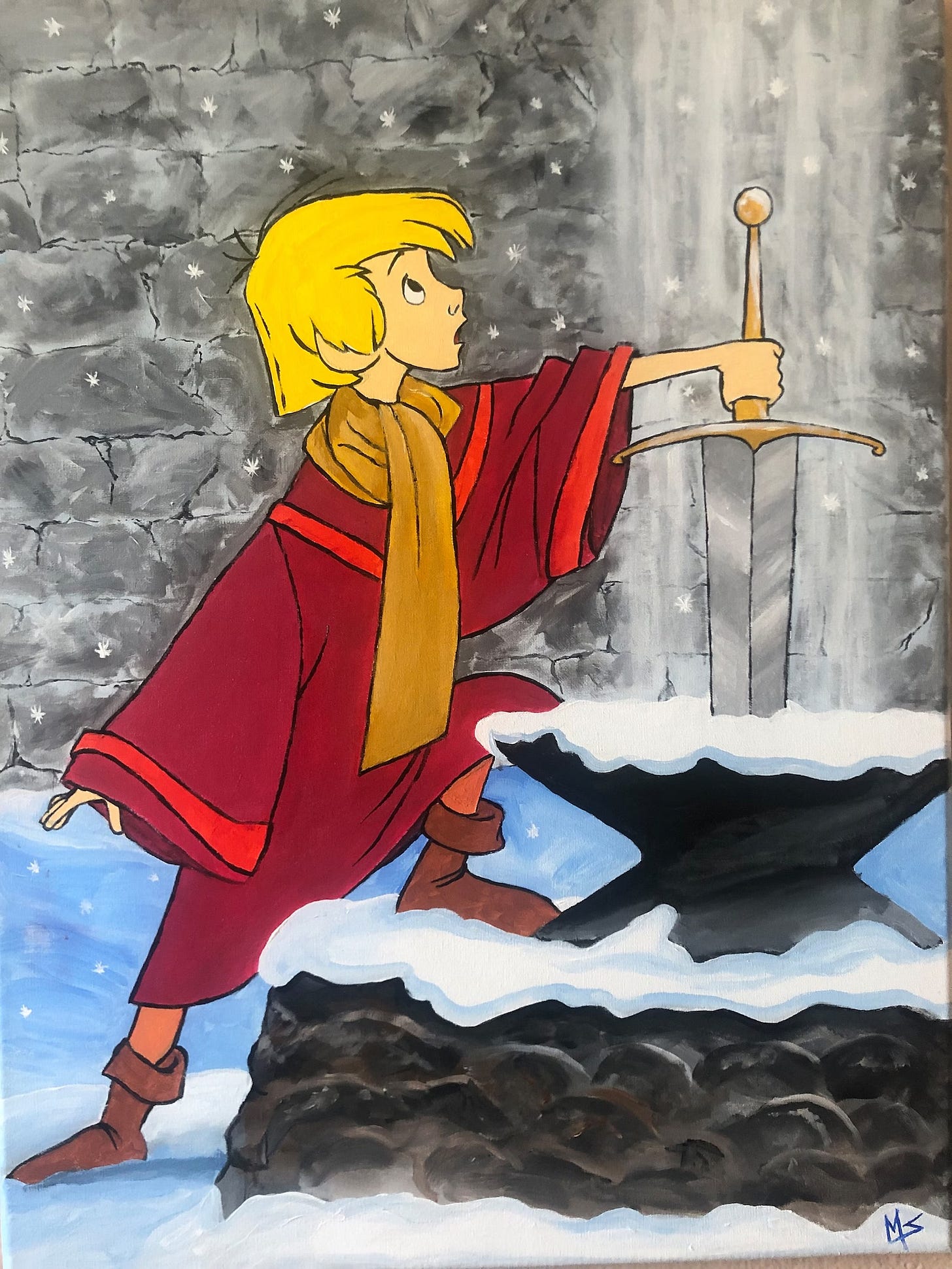I met King Arthur for the first time when I was in 7th grade, in the form of the Wart from T.H. White’s The Sword in the Stone. I think you’re supposed to know all along that Wart’s going to turn out to be King Arthur at the end, but for me—a gormless adolescent in the darkness of pre-internet suburban America—it was a shock twist. Wait—the Wart is who now?
I also didn’t realize, because it was the only King Arthur book I’d ever read, how different White’s book was from everything else anybody ever wrote about Arthur. I think (real Arthurians, please correct me) that White was the first writer to think seriously about Arthur’s childhood, and about Arthur as a little boy—to take the great and terrible dux-bellorum-cum-dying-and-reviving-priest-king of legend and make him over into Christopher Robin.
It’s still an amazing creative feat. Nobody has ever made us feel that close to King Arthur, before or since.
But then I went on and read the rest of The Once and Future King, and although I relished the jousting and the sexy bits—viz “naked as a needle”—and took to picturing my dodgeball teammates in gym as the knights of old, Lancelot and Gawain and Pellinore, I never felt that close to Arthur again. White seems to go a little cool on him as a character. Arthur gets upstaged by Lancelot and his many agonies, much the way Charlie Brown got upstaged by Snoopy in Peanuts.
I think this is partly because even though everybody feels like they know him, for a novelist Arthur is actually an extremely difficult character to figure out; it was definitely one of the (many) hard parts of writing The Bright Sword. After he pulls the sword out of the stone, and sires Mordred with Morgause, the legend just doesn’t give Arthur that much to do. As a king he’s too OP to be very interesting—he defeats everybody and they stay defeated. He has no kids. He bemoans but doesn’t stop the quest for the Holy Grail. He bemoans but doesn’t stop Guinevere and Lancelot sleeping together. He’s clearly carrying around some traumatic baggage, from his weird childhood and the horrible story of his conception, but whatever he’s feeling all that time, it has no outlet in dramatic action, and inevitably our sense of his interior life wanes.
He’s not even much of a lover. Arthur is strong but—and I say this as the most loyal of fans—he’s not very sexy. In support of this claim I draw your attention to an acerbic epistolary exchange between two very astute readers, Dorothy L. Sayers and C.S. Lewis.1 “The unfortunate fact,” Sayers writes, “seems to be that you cannot make a heroic figure out of a cuckold.” Lewis replies: “Once his court was made the nucleus of ‘adventures’ he was bound to fade: sinks into the Headmaster.”
There you have it: King Arthur is a cuck. He’s passive—unlike Tennyson’s Ulysses (“It little profits that an idle king/By this still hearth ...”) he gets no hearty late-life call to adventure. He’s got nothing left to do except get betrayed by Lancelot, bullied by Gawain, killed by Mordred and then ferried by Morgan off to Avalon. His one great character trait is that Arthurian longing for the immanent, for the paradox of earthly perfection, that makes briefly real his vision of a glorious golden age. There’s any amount of pathos to his end, but it’s more because he’s a Victim of Fate than because he’s a rich round character.
It’s entirely possible that we’re not supposed to know the heart and mind of the king, that Arthur’s thoughts are beyond knowing, and novelists aren’t supposed to go groping around in there with their grubby inky fingers. I think that’s why a lot of Arthurian fiction has somebody besides Arthur as the POV figure. Maybe Arthur is a Holmes, not a Watson. A Gatsby, not a Nick Carraway. Not designed as a playable character.
But we all remember the Wart, and we all know he’s still in there somewhere. Maybe Arthur’s stillness is like Hamlet’s, he’s brooding and paralyzed, pitted against himself in an internal contest so fierce that neither side will yield, but which produces only external stasis. It’s too bad Shakespeare never took on Arthur, he really needed the Bard to give him a few monologues. Or at least to send a Rosencrantz and/or Guildenstern to chat him up. Glean what afflicts him.
Obviously that didn’t end well for Rosencrantz and Guildenstern. But you know what I mean.
I have Gabriel Schenk—who is an actual Arthurian scholar—to thank for finding and pointing me to this exchange






Thanks for sharing the Sayers/Lewis exchange. I have always felt that the unhealthy preoccupation with Lancelot and Guinevere is why there's no really great contemporary story about Arthur. Infidelity is rife in media (and I guess real life) - are we really supposed to buy that it caused the whole near-utopia of Arthurian Britain to implode? Bah! I remember reading that you were working on an Arthurian story a few years ago, and am glad to see it's release is imminent. I'm gonna go preorder it now!
When do we see the rise of a sophisticated tradition of representing leadership in fiction? What kind of society offers an audience hungry for that kind of story? How does the tragic tradition of heroic poetry oppose the kind of narrative trajectory we might otherwise look for in Arthurian stories now? Thanks for the provocative post, Lev.